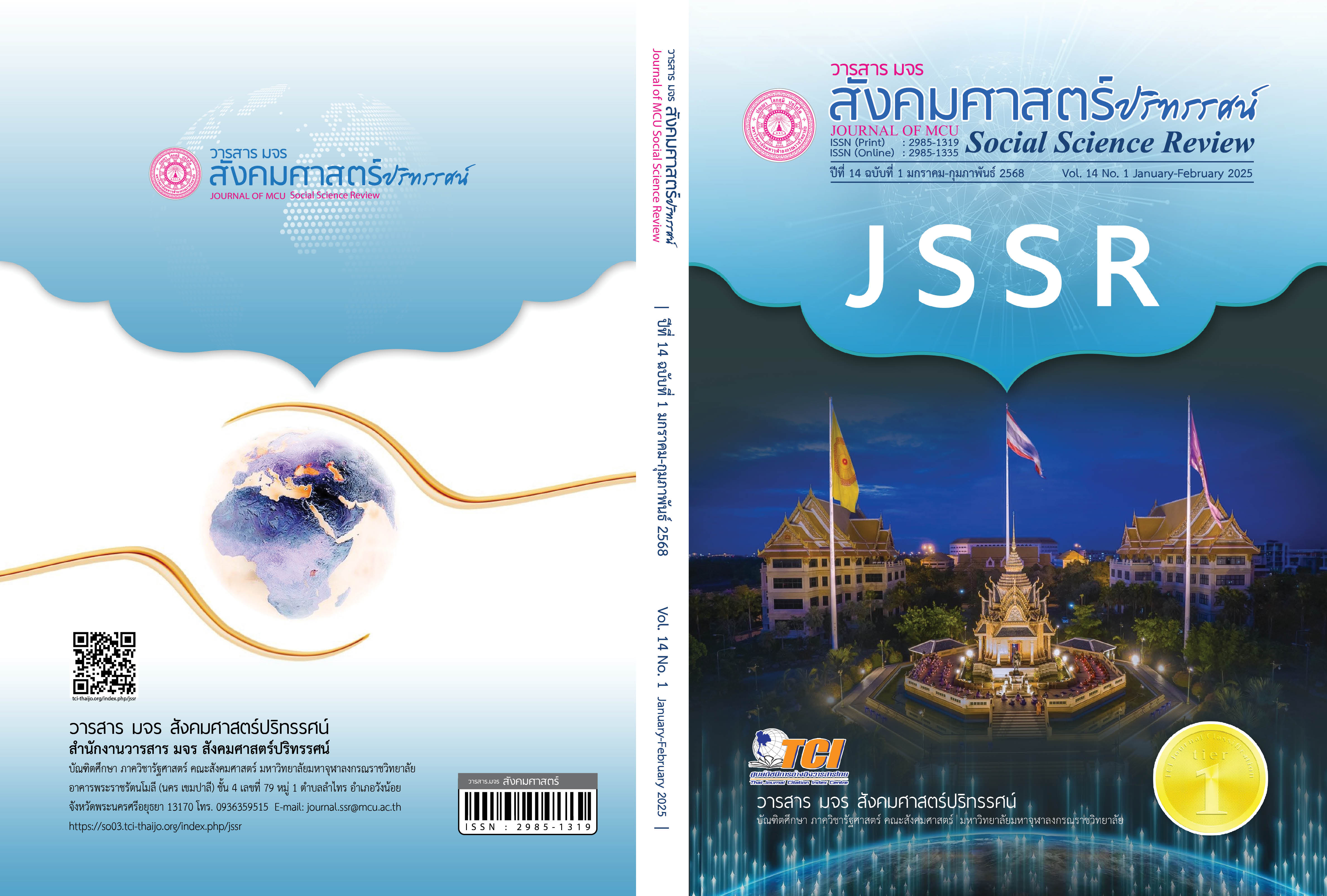บทบาทของสภาพัฒนาการเมืองตามรัฐธรรมนูญ 2560 ในการส่งเสริมการมีส่วนร่วมทางการเมืองของกลุ่มผู้ด้อยโอกาส
คำสำคัญ:
สภาพัฒนาการเมือง, การมีส่วนร่วมทางการเมือง, กลุ่มผู้ด้อยโอกาสบทคัดย่อ
บทความวิจัยนี้วัตถุประสงค์ 1. ศึกษาบทบาทและการดำเนินงานของสภาพัฒนาการเมืองตามรัฐธรรมนูญ 2560 ในการส่งเสริมการมีส่วนร่วมทางการเมืองของกลุ่มผู้ด้อยโอกาส 2. วิเคราะห์อุปสรรคและความท้าทายในการมีส่วนร่วมทางการเมืองของกลุ่มผู้ด้อยโอกาส ได้แก่ ผู้พิการ ผู้สูงอายุ ผู้มีรายได้น้อย และชนกลุ่มน้อย และ 3. เสนอแนะแนวทางในการพัฒนาบทบาทของสภาพัฒนาการเมืองให้สามารถส่งเสริมการมีส่วนร่วมทางการเมืองของกลุ่มผู้ด้อยโอกาส งานวิจัยนี้เป็นงานวิจัยเชิงคุณภาพโดยใช้วิธีวิจัยเอกสาร เก็บข้อมูลจากเอกสารปฐมภูมิและทุติยภูมิ วิเคราะห์ข้อมูลโดยใช้การวิเคราะห์เนื้อหา
ผลการวิจัยพบว่า 1. บทบาทสภาพัฒนาการเมืองถูกยุติตามคำสั่ง คสช. 71/2559 ทำให้เกิดช่องว่างในการส่งเสริมการมีส่วนร่วมของผู้ด้อยโอกาส แม้รัฐธรรมนูญ 2560 จะวางรากฐานการคุ้มครองสิทธิไว้ในมาตรา 27, 70 และ 78 แต่การบังคับใช้ยังมีข้อจำกัด 2. อุปสรรคสำคัญของผู้ด้อยโอกาส นอกจากด้านกายภาพและการเข้าถึงข้อมูลแล้ว ยังพบปัญหาเชิงทัศนคติที่รู้สึกว่าเสียงของตนไม่ได้รับการรับฟัง ขณะที่การบูรณาการระหว่างหน่วยงานและกลไกระดับท้องถิ่นยังไม่มีประสิทธิภาพ 3. แนวทางพัฒนาที่สำคัญ คือ การปรับปรุงกฎหมายเลือกตั้ง มาตรา 28 และ 30 เพื่อเพิ่มมาตรการอำนวยความสะดวก การกำหนดโควตาผู้แทนในคณะกรรมการการพัฒนาช่องทางสื่อสารที่เข้าถึงง่าย และการจัดตั้งศูนย์ส่งเสริมการมีส่วนร่วมระดับท้องถิ่น โดยต้องมีระบบติดตามประเมินผลที่มีประสิทธิภาพ อย่างไรก็ตาม การส่งเสริมการมีส่วนร่วมทางการเมืองของผู้ด้อยโอกาสยังเผชิญความท้าทายด้านการบูรณาการระหว่างหน่วยงานการเข้าถึงพื้นที่ห่างไกล และข้อจำกัดด้านทรัพยากร จึงต้องพัฒนาระบบนิเวศที่เอื้อต่อการมีส่วนร่วมทั้งด้านโครงสร้างพื้นฐาน ข้อมูลข่าวสาร และกลไกการมีส่วนร่วม โดยอาศัยความร่วมมือจากทุกภาคส่วน
เอกสารอ้างอิง
กรมกิจการเด็กและเยาวชน. (2566). ข้อมูลเกี่ยวกับประชากรกลุ่มผู้ด้อยโอกาสในประเทศไทย. กรุงเทพฯ: กรมกิจการเด็กและเยาวชน.
กระทรวงการพัฒนาสังคมและความมั่นคงของมนุษย์. (2564). แนวทางการพัฒนาผู้ด้อยโอกาสในประเทศไทย. กรุงเทพฯ: กระทรวงการพัฒนาสังคมและความมั่นคงของมนุษย์.
กองทุนเพื่อความเสมอภาคทางการศึกษา (กสศ.). (2566). รายงานสถานการณ์ความเหลื่อมล้ำ ทางการศึกษา ปี 2566. สืบค้น 23 พฤศจิกายน 2567, จาก https://shorturl.asia/HFnCa
คณะรักษาความสงบแห่งชาติ. (2559). คำสั่ง คสช. ที่ 71/2559 เรื่อง ยกเลิกกฎหมายว่าด้วยสภาที่ปรึกษาเศรษฐกิจและสังคมแห่งชาติ รวมถึงกฎหมายว่าด้วยสภาพัฒนาการเมือง. สืบค้น 23 พฤศจิกายน 2567, จากhttps://www.thairath.co.th/news/424561
บวรศักดิ์ อุวรรณโณ. (2561). ทฤษฎีประชาธิปไตยแบบมีส่วนร่วม. กรุงเทพฯ: สำนักพิมพ์มหาวิทยาลัยธรรมศาสตร์.
มูลนิธิสถาบันวิจัยและพัฒนาผู้สูงอายุไทย. (2563). การศึกษาเกี่ยวกับผู้สูงอายุและความเหลื่อมล้ำในสังคมไทย. กรุงเทพฯ: มูลนิธิสถาบันวิจัยและพัฒนาผู้สูงอายุไทย.
สถาบันพระปกเกล้า. (2564). รายงานการศึกษาสถานการณ์การมีส่วนร่วมทางการเมืองในประเทศไทย. กรุงเทพฯ: สถาบันพระปกเกล้า.
สำนักงานคณะกรรมการกฤษฎีกา. (2560). รัฐธรรมนูญแห่งราชอาณาจักรไทย พุทธศักราช 2560. กรุงเทพฯ: สำนักงานคณะกรรมการกฤษฎีกา.
สำนักงานเลขาธิการสภาการศึกษา. (2565). รายงานการใช้สิทธิเลือกตั้งของประชากรกลุ่มด้อยโอกาส. กรุงเทพฯ: สำนักงานเลขาธิการสภาการศึกษา.
สำนักงานสถิติแห่งชาติ. (2563). รายงานสถานการณ์ผู้ด้อยโอกาสในประเทศไทย. กรุงเทพฯ: สำนักงานสถิติแห่งชาติ.
Brinkerhoff, D. W. (2004). The Enabling Environment for Implementing the Millennium Development Goals: Government Actions to Support NGOs. Retrieved March 20, 2023, from https://shorturl.asia/Nb0sD
Lührmann, A. et al. (2023). Walk the Talk: How State Commitments to Democracy Matter. American Journal of Political Science, 67(1), 22-37.
Mattila, M. & Papageorgiou, A. (2017). Disability, perceived discrimination and political participation. International Political Science Review, 38(5), 505-519.
Ojendal, J. & Lilja, M. (2009). Beyond Democracy in Cambodia: Political Reconstruction in a Post-Conflict Society. Copenhagen: NIAS Press.
Schur, L. & Adya, M. (2023). Sidelined or Mainstreamed? Political Participation and Attitudes of People with Disabilities in the United States. Social Science Quarterly, 104(1), 259-275.
Schur, L. et al. (2020). Disability and voting accessibility in the 2020 elections: Final report on survey results. Retrieved March 20, 2023, from https://shorturl.asia/TAzlZ
ดาวน์โหลด
เผยแพร่แล้ว
รูปแบบการอ้างอิง
ฉบับ
ประเภทบทความ
สัญญาอนุญาต
ลิขสิทธิ์ (c) 2024 วารสาร มจร สังคมศาสตร์ปริทรรศน์

อนุญาตภายใต้เงื่อนไข Creative Commons Attribution-NonCommercial-NoDerivatives 4.0 International License.
เพื่อให้เป็นไปตามกฎหมายลิขสิทธิ์ ผู้นิพนธ์ทุกท่านต้องลงลายมือชื่อในแบบฟอร์มใบมอบลิขสิทธิ์บทความให้แก่วารสารฯ พร้อมกับบทความต้นฉบับที่ได้แก้ไขครั้งสุดท้าย นอกจากนี้ ผู้นิพนธ์ทุกท่านต้องยืนยันว่าบทความต้นฉบับที่ส่งมาตีพิมพ์นั้น ได้ส่งมาตีพิมพ์เฉพาะในวารสาร มจร สังคมศาสตร์ปริทรรศน์ เพียงแห่งเดียวเท่านั้น หากมีการใช้ภาพหรือตารางหรือเนื้อหาอื่นๆ ของผู้นิพนธ์อื่นที่ปรากฏในสิ่งตีพิมพ์อื่นมาแล้ว ผู้นิพนธ์ต้องขออนุญาตเจ้าของลิขสิทธิ์ก่อน พร้อมทั้งแสดงหนังสือที่ได้รับการยินยอมต่อบรรณาธิการ ก่อนที่บทความจะได้รับการตีพิมพ์ หากไม่เป็นไปตามข้อกำหนดเบื้องต้น ทางวารสารจะถอดบทความของท่านออกโดยไม่มีข้อยกเว้นใดๆ ทั้งสิ้น





